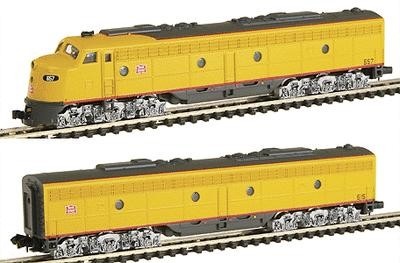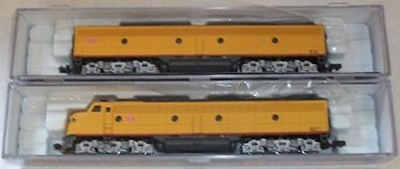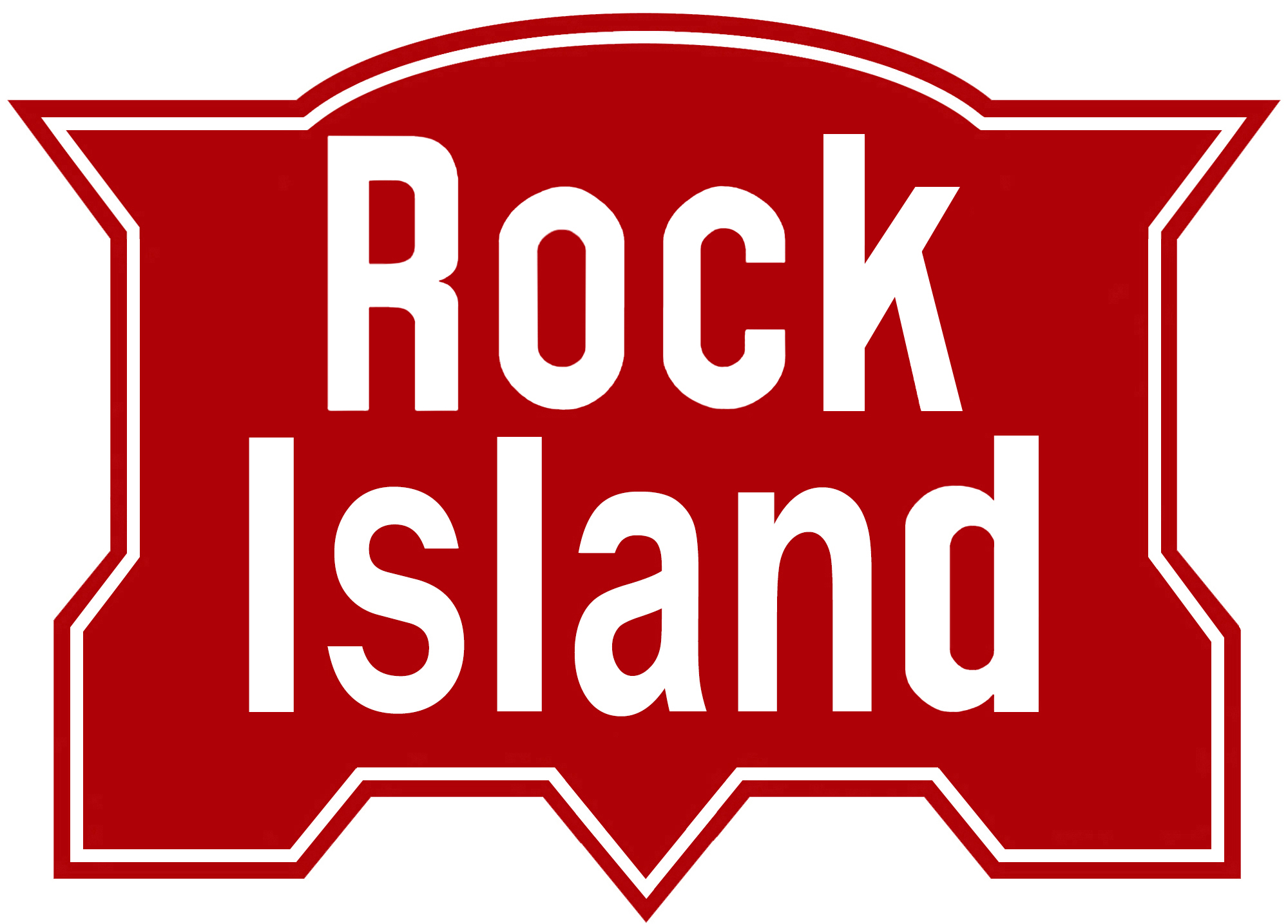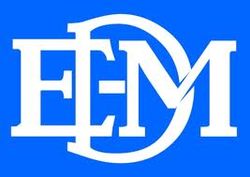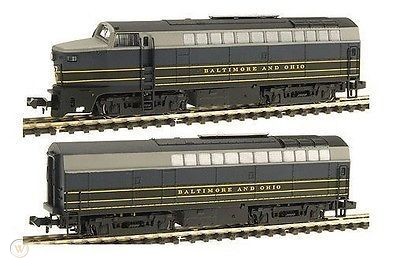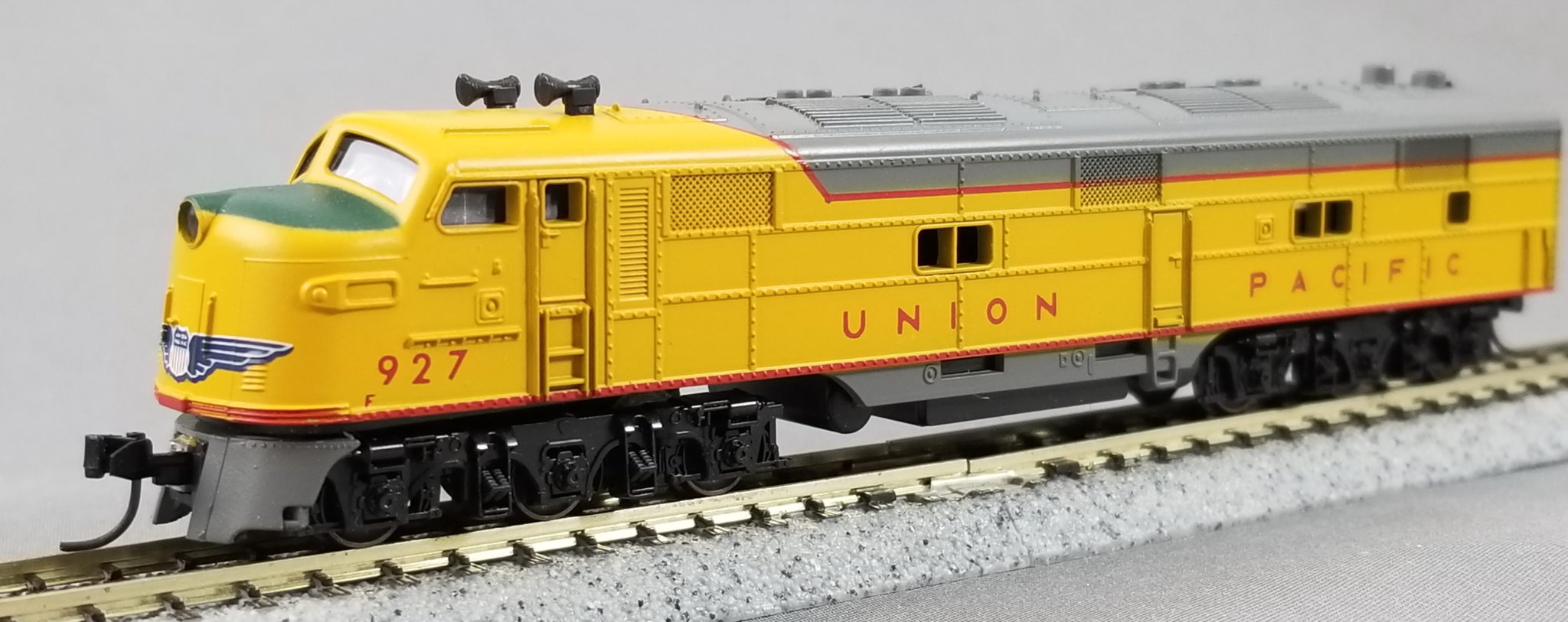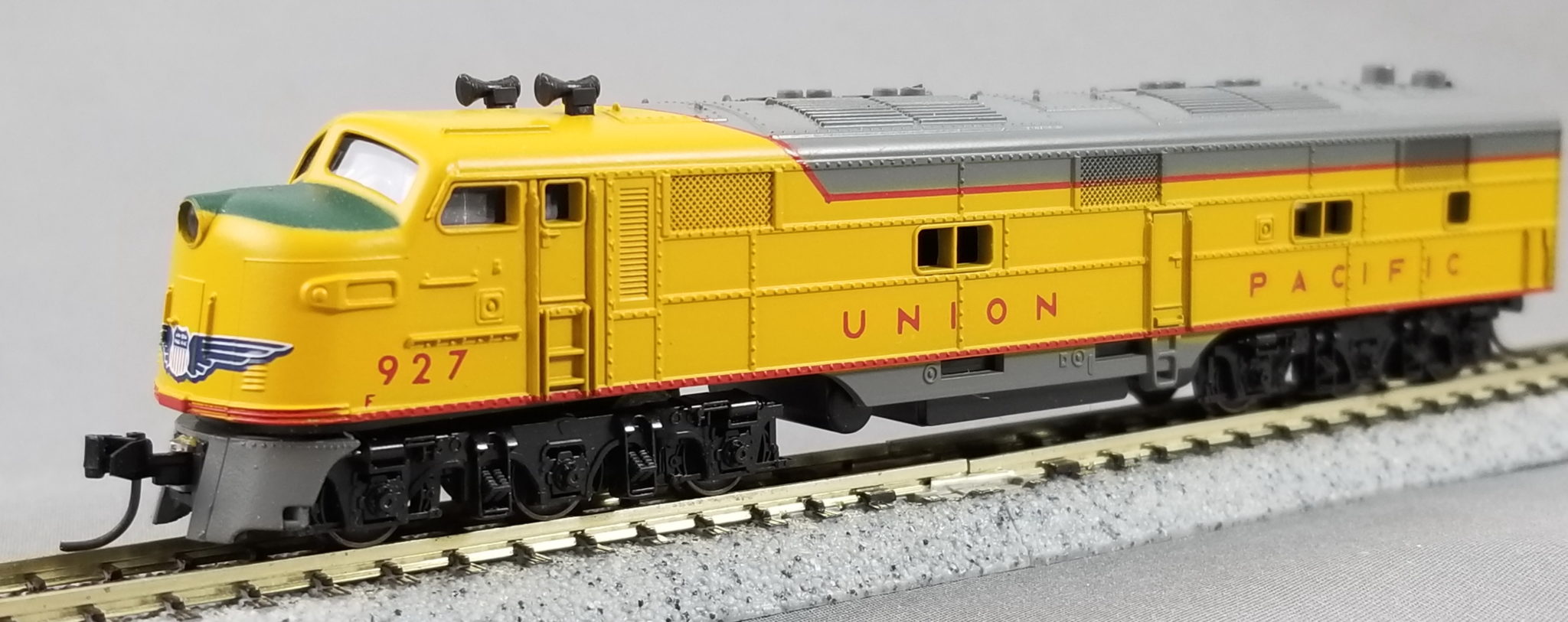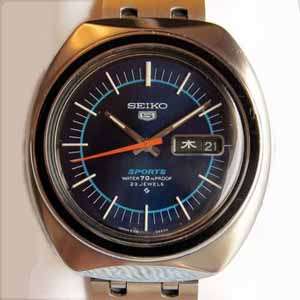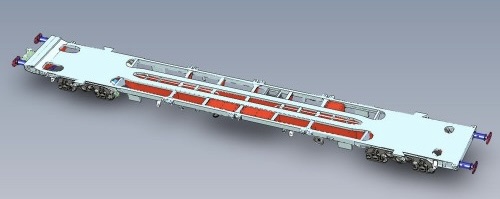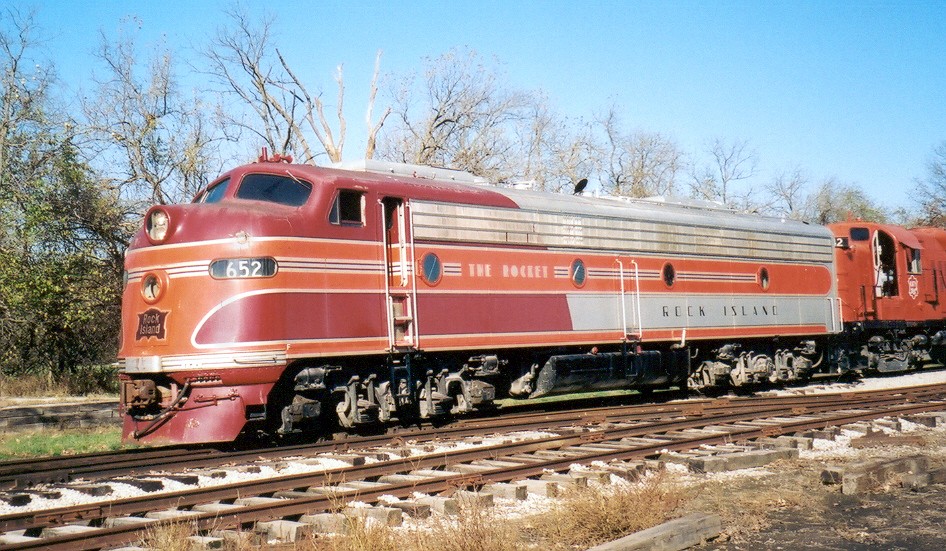Model Information: Life-Like first released this model in 1995. Dummy B units were later released in 1997.
The model was completely revised in 2003 and supplemented by a powered E8B. It was re-run again in 2006 (after Walthers acquired Life-Like); it was sold either as single A-unit or as A+B set, both powered.
Dummy body-mount knuckle coupler in front of A units. Rapido hook in rear of A units and on both sides for B units., truck-mount for the early releases, and body-mount for the 2003/2006 releases.
The model was completely revised in 2003 and supplemented by a powered E8B. It was re-run again in 2006 (after Walthers acquired Life-Like); it was sold either as single A-unit or as A+B set, both powered.
Dummy body-mount knuckle coupler in front of A units. Rapido hook in rear of A units and on both sides for B units., truck-mount for the early releases, and body-mount for the 2003/2006 releases.
DCC Information: None of the versions have support for DCC
Prototype History: The E8 was a 2,250-horsepower (1,678 kW), A1A-A1A passenger-train locomotive built by General Motors' Electro-Motive Division (EMD) of La Grange, Illinois. 450 cab versions, or E8As, were built from August 1949 to January 1954, 447 for the U.S. and 3 for Canada. 46 E8Bs were built from December 1949 to January 1954, all for the U.S. The 2,250 hp came from two 12 cylinder model 567B engines, each driving a generator to power the two traction motors on one truck. The E8 was the ninth model in the line of passenger diesels of similar design known as EMD E-units. Starting in September 1953 at total of 21 E8As were built which used either the 567BC or 567C engines.
Most of the premier passenger trains including the AT&SF "Super Chief," various CB&Q "Zephyrs," Great Northern's "Empire Builder," New York Central's "Twentieth Century" and Pennsylvania Railroad's "Broadway Limited" were pulled by EMD "E" unit diesel locomotives from the 1940's to the 1970's.
In profile the front of the nose of E7, E8, and E9 units is less slanted than earlier EMD units, and E7/8/9s (and their four axle cousins, the F-unit series) have been nicknamed bulldog nose units. Earlier E-unit locomotives were nicknamed slant nose units. After passenger trains were canceled on the Erie Lackawanna in 1970, the E8s were re-geared for freight and were very reliable for the EL. These units were on freight trains until the early years of Consolidated Railroad Corporation ("Conrail").
Units noted with the designation E8m were rebuilt using components from earlier EMC/EMD locomotives. Externally the units look just like E8s. The difference in horsepower produced in these E8m units is because the older generators are reused.
From Wikipedia
Read more on American-Rails.com
Most of the premier passenger trains including the AT&SF "Super Chief," various CB&Q "Zephyrs," Great Northern's "Empire Builder," New York Central's "Twentieth Century" and Pennsylvania Railroad's "Broadway Limited" were pulled by EMD "E" unit diesel locomotives from the 1940's to the 1970's.
In profile the front of the nose of E7, E8, and E9 units is less slanted than earlier EMD units, and E7/8/9s (and their four axle cousins, the F-unit series) have been nicknamed bulldog nose units. Earlier E-unit locomotives were nicknamed slant nose units. After passenger trains were canceled on the Erie Lackawanna in 1970, the E8s were re-geared for freight and were very reliable for the EL. These units were on freight trains until the early years of Consolidated Railroad Corporation ("Conrail").
Units noted with the designation E8m were rebuilt using components from earlier EMC/EMD locomotives. Externally the units look just like E8s. The difference in horsepower produced in these E8m units is because the older generators are reused.
From Wikipedia
Read more on American-Rails.com
Road Name History: The Chicago, Rock Island and Pacific Railroad (CRI&P RR) (reporting marks RI, ROCK) was a Class I railroad in the United States. It was better known as the Rock Island Line, or, in its final years, The Rock. At the end of 1970 it operated 7183 miles of road on 10669 miles of track; that year it reported 20557 million ton-miles of revenue freight and 118 million passenger-miles. (Those totals may or may not include the former Burlington-Rock Island Railroad.)
Its predecessor, the Rock Island and La Salle Railroad Company, was incorporated in Illinois on February 27, 1847, and an amended charter was approved on February 7, 1851, as the Chicago and Rock Island Railroad. Construction began October 1, 1851, in Chicago, and the first train was operated on October 10, 1852, between Chicago and Joliet. Construction continued on through La Salle, and Rock Island was reached on February 22, 1854, becoming the first railroad to connect Chicago with the Mississippi River.
In 1980 Rock Island was liquidated. The railroad's locomotives, rail cars, equipment, tracks, and real estate were sold to other railroads or to scrappers. William Gibbons (the trustee) was able to raise more than $500 million in the liquidation, paying off all the railroad's creditors, bondholders and all other debts in full at face value with interest. Henry Crown was ultimately proven correct, as both he and other bondholders who had purchased Rock Island debt for cents on the dollar during the low ebb in prices did especially well.
Read more on Wikipedia and Rock Island Technical Society.
Its predecessor, the Rock Island and La Salle Railroad Company, was incorporated in Illinois on February 27, 1847, and an amended charter was approved on February 7, 1851, as the Chicago and Rock Island Railroad. Construction began October 1, 1851, in Chicago, and the first train was operated on October 10, 1852, between Chicago and Joliet. Construction continued on through La Salle, and Rock Island was reached on February 22, 1854, becoming the first railroad to connect Chicago with the Mississippi River.
In 1980 Rock Island was liquidated. The railroad's locomotives, rail cars, equipment, tracks, and real estate were sold to other railroads or to scrappers. William Gibbons (the trustee) was able to raise more than $500 million in the liquidation, paying off all the railroad's creditors, bondholders and all other debts in full at face value with interest. Henry Crown was ultimately proven correct, as both he and other bondholders who had purchased Rock Island debt for cents on the dollar during the low ebb in prices did especially well.
Read more on Wikipedia and Rock Island Technical Society.
Brand/Importer Information:  Life-Like Products LLC (now Life-Like Toy and Hobby division of Wm. K. Walthers) was a manufacturer of model railroad products and was based in Baltimore, Maryland.
Life-Like Products LLC (now Life-Like Toy and Hobby division of Wm. K. Walthers) was a manufacturer of model railroad products and was based in Baltimore, Maryland.
It was founded in the 1950s by a company that pioneered extruded foam ice chests under the Lifoam trademark. Because ice chests are a summer seasonal item, the company needed a way to keep the factory operating year round. As model railroading was becoming popular in the post-war years, they saw this as an opportunity and so manufactured extruded foam tunnels for model trains. Over the years, Life-Like expanded into other scenery items, finally manufacturing rolling stock beginning in the late 1960s. At some point in the early 1970s, Life-Like purchased Varney Inc. and began to produce the former Varney line as its own.
The Canadian distributor for Life-Like products, Canadian Hobbycraft, saw a missing segment in market for Canadian model prototypes, and started producing a few Canadian models that were later, with a few modifications, offered in the US market with US roadnames.
In 2005, the company, now known as Lifoam Industries, LLC, decided to concentrate on their core products of extruded foam and sold their model railroad operations to Wm. K. Walthers.
In June 2018, Atlas and Walthers announced to have reached an agreement under which all Walthers N scale rolling stock tooling, including the former Life-Like tooling, will be purchased by Atlas.
Read more on Wikipedia and The Train Collectors Association.

It was founded in the 1950s by a company that pioneered extruded foam ice chests under the Lifoam trademark. Because ice chests are a summer seasonal item, the company needed a way to keep the factory operating year round. As model railroading was becoming popular in the post-war years, they saw this as an opportunity and so manufactured extruded foam tunnels for model trains. Over the years, Life-Like expanded into other scenery items, finally manufacturing rolling stock beginning in the late 1960s. At some point in the early 1970s, Life-Like purchased Varney Inc. and began to produce the former Varney line as its own.
The Canadian distributor for Life-Like products, Canadian Hobbycraft, saw a missing segment in market for Canadian model prototypes, and started producing a few Canadian models that were later, with a few modifications, offered in the US market with US roadnames.
In 2005, the company, now known as Lifoam Industries, LLC, decided to concentrate on their core products of extruded foam and sold their model railroad operations to Wm. K. Walthers.
In June 2018, Atlas and Walthers announced to have reached an agreement under which all Walthers N scale rolling stock tooling, including the former Life-Like tooling, will be purchased by Atlas.
Read more on Wikipedia and The Train Collectors Association.
Item created by: Alain LM on 2021-09-12 13:40:44. Last edited by Alain LM on 2021-09-12 13:43:52
If you see errors or missing data in this entry, please feel free to log in and edit it. Anyone with a Gmail account can log in instantly.
If you see errors or missing data in this entry, please feel free to log in and edit it. Anyone with a Gmail account can log in instantly.


